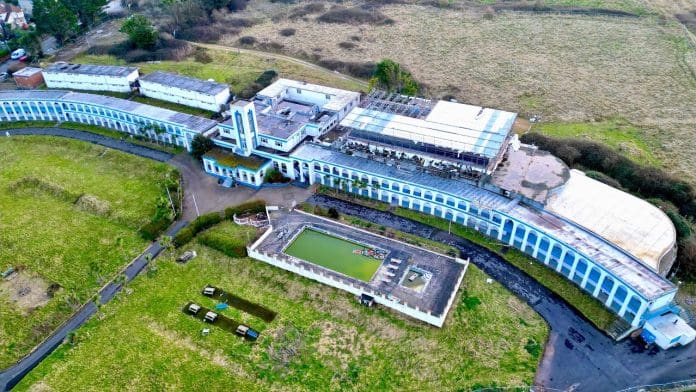Perched above Bowleaze Cove on Dorset’s Jurassic Coast, the Riviera Hotel stands as a striking example of 1930s modernist architecture. Designed by local architect Lionel Stewart Smith and constructed between 1936 and 1937, the hotel features sweeping arcs, a central tower, and Mediterranean-inspired details. This Grade II listed building was envisioned as a luxury destination for the burgeoning class of car-owning holidaymakers seeking seaside leisure.
A Grand Beginning and Wartime Service
The Riviera’s early days were marked by financial challenges. Its original developer, Joseph Rowland Bradley, declared bankruptcy before the hotel could open, leaving the completed structure unused until new ownership facilitated its debut in May 1939. Marketed as “Weymouth’s most perfect holiday centre,” the hotel boasted 69 bedrooms, a private beach, and recreational amenities including tennis courts and a bowling green.
During the Second World War, the hotel was repurposed to house evacuated children with disabilities from London, providing them with safety and care away from the city. Post-war, the Riviera resumed its role as a holiday destination. In 1958, it became part of Fred Pontin’s holiday camp chain, Pontins, and underwent expansions in the 1960s, including the addition of a ballroom. However, the hotel faced setbacks with fires in 1960 and 1968 that caused significant damage but did not halt its operations.
Decline and Efforts at Renewal
The Riviera changed hands in 1999 and again in 2009, when it was acquired by the Saudi Arabian hospitality group Diyafa. A £4 million refurbishment between 2010 and 2012 aimed to modernise the facilities, reducing the number of rooms to enhance comfort and updating communal areas. Despite these efforts, the hotel struggled to regain its former prominence.
During the COVID-19 pandemic, the Riviera provided temporary accommodation for the homeless, highlighting its continued community relevance. In 2020, the hotel was listed for sale at £5.5 million but failed to attract a buyer, leading to its removal from the market in 2021. By 2023, the Twentieth Century Society had placed the Riviera on its ‘Buildings at Risk’ register, citing ongoing decline and neglect.
Planning and Conservation Enforcement: A Role in Its Future
As of May 2025, Dorset Council is now consulting with Planning and Conservation Enforcement Officers to attempt to establish a way forward for the Riviera Hotel. Despite what one may read on social media, it appears that the future is very much up in the air.
The fate of the Riviera Hotel increasingly depends on the actions of planning and conservation enforcement officers, whose roles are essential in protecting heritage assets such as this.
Planning Enforcement Officers investigate breaches of planning law such as unauthorised alterations, changes of use, or developments carried out without permission. In the case of listed buildings like the Riviera, such breaches can have significant consequences.
Conservation Enforcement Officers, meanwhile, focus specifically on safeguarding historic buildings. They ensure that any works on listed structures are lawful and sympathetic to their character. They also investigate unauthorised changes and may pursue legal action, issue enforcement notices, or coordinate urgent repairs through statutory powers.
These officers act as custodians of the built environment, helping ensure historic sites like the Riviera are not further compromised by neglect or inappropriate development.
Looking Ahead: Preservation or Further Decline?
The future of the Riviera Hotel remains uncertain. While its architectural significance is undisputed, the building faces challenges common to historic structures: the need for substantial investment, a clear vision for sustainable use, and firm regulatory oversight.
Preservation advocates argue that, with proper restoration and adaptive reuse, perhaps guided and enforced by planning and conservation professionals, the Riviera could once again serve as a vibrant part of Weymouth’s coastal landscape.
As it stands, the Riviera Hotel is at a crossroads, embodying both the rich history of British seaside resorts and the pressing need for thoughtful, enforceable preservation of architectural heritage.







